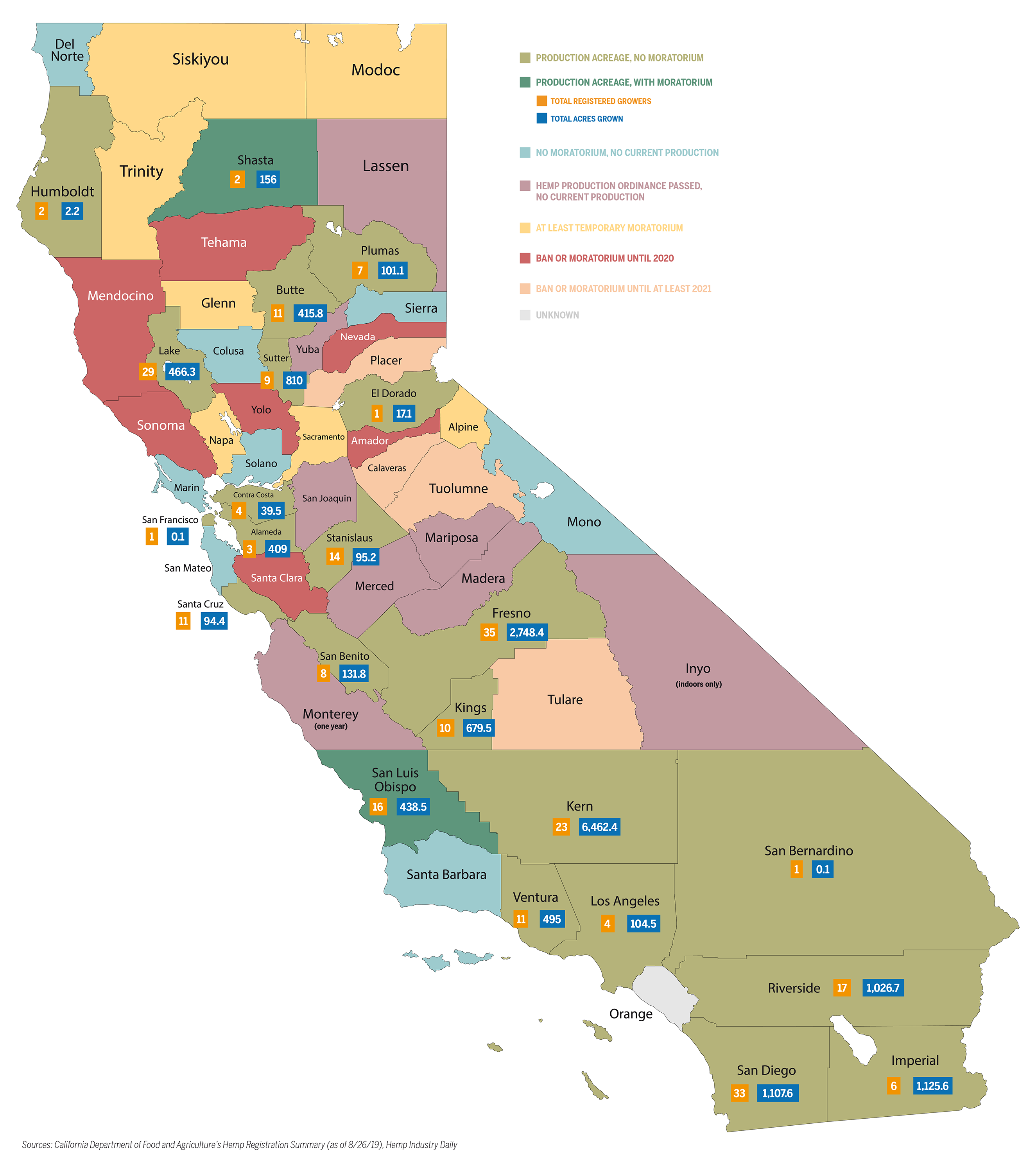 (Editor’s note: This is part of an occasional series on California’s complex hemp industry. To read the previous installment, click here.)
(Editor’s note: This is part of an occasional series on California’s complex hemp industry. To read the previous installment, click here.)
California’s county-by-county regulatory landscape for hemp production is as varied as its actual scenery.
In some of its counties, California is one of the last strongholds against hemp production, while in others, efforts to grow the crop are underway or ordinances have been passed that will soon allow farmers to move forward.
Anticipated to be a future powerhouse of hemp production because of its rich soils and temperate climate that allows for year-round cultivation, California has lagged behind other hemp states as the only one to make county-level agriculture commissioners responsible for passing hemp production ordinances in each of its 58 counties.
According to a late August update from the California Department of Food and Agriculture (CDFA), the state currently has 23 counties producing hemp, with 258 growers, 34 seed breeders and 16,899 registered acres.
Hemp Industry Daily examined the status of the rest of the counties and learned through local news reports and county agriculture commissioners that:
- Of the 23 counties with licensed hemp acreage, two still have county-wide moratoriums in place until 2020 – Shasta County, in which a municipality legalized hemp production within city limits; and San Luis Obispo (SLO), which licensed 16 hemp farmers and nine farmers producing hemp for research before enacting an emergency moratorium that was extended to June 2020. Marc Lea, assistant agricultural commissioner for the county, told Hemp Industry Daily that SLO county provided direction to develop a permanent ordinance by early 2020 that would supersede the moratorium and allow for cultivation.
- Sixteen counties do not have current bans on hemp production and at least eight of these have passed hemp production ordinances, but production hasn’t yet begun. Hemp production in Santa Barbara County is allowed for research only.
- Seven counties have at least a temporary moratorium in place, which could be extended for up to 22 months and 15 days if the county board of supervisors so decides.
- Seven counties have banned production until 2020. This includes Santa Clara County, which doesn’t currently have a moratorium but has banned hemp production until the federal and state regulations are implemented. The rest of the counties voted to extend their respective hemp moratoriums until spring 2020.
- Four counties have put hemp production bans in place until 2021.
Restrictions becoming even more local
Some municipalities are developing their own city rules around hemp businesses, in many cases going against current county hemp regulation.
The city of Shasta Lake in Shasta County has licensed hemp farmers within its city limits, going against the county’s current moratorium, in place until the end of March 2020, Shasta County Agriculture Commissioner Rick Gurrola told Hemp Industry Daily.
Pittsburg, a city in Contra Costa County, enacted a 2-year moratorium on hemp production in June to give the city time to develop regulations because the current city ordinance on cannabis did not address hemp, nor do state cannabis regulations.
In July, the Fortuna City Council in Humboldt County voted to extend a city moratorium for 180 days or until 2020, saying state and federal regulations are still in flux and because hemp is indistinguishable from marijuana. The moratorium will allow time for the city to review regulations and adopt its own policies
The Thousand Oaks City Council in Ventura County voted this week to approve a 45-day, citywide moratorium on hemp businesses to allow time to look at the potential impact of hemp on local businesses.
The moratorium prohibits cultivation, processing, drying, storing and manufacturing hemp, and bans new stores from exclusively selling CBD products.
Before the moratorium was approved, hemp company Ventura Seed Co. signed a lease for a 35,000-square-foot building in a Thousand Oaks business park to process its crops into CBD products. But the company, which has plants ready for harvesting and processing, said it may have to move to another city because it can’t wait for the moratorium to end in November.
California law protects hemp … and local government
A measure currently on California Gov. Gavin Newsom’s desk to revise California’s provisions regulating hemp cultivation and testing includes language that says enacting the legislation would “neither limit nor prevent a city, county or city and county from exercising its police power authority.”
Gurrola told Hemp Industry Daily he interprets that to mean the legislation protects the power of local government “to do whatever they want to do with industrial hemp,” including banning it.
“It’s been determined that cities and counties do have that authority now, through actual court cases,” Gurrola said. “But the reason that it is specifically addressed … is to stave off future lawsuits.”
In early September, Newsom signed an amendment to the Williamson Act, clarifying that cannabis and hemp cultivation count as an agricultural commodity or compatible use within agricultural land conservation contracts.
According to a blog post by Caroline Gill of Los Angeles-based law firm Manzuri Law, the passage of the amendment will make it more difficult for local governments to outlaw hemp by claiming it is not agricultural commodity, though the change in law “in no way curbs local government’s authority and ability to prohibit or regulate commercial cannabis and hemp.”
Laura Drotleff can be reached at [email protected]


